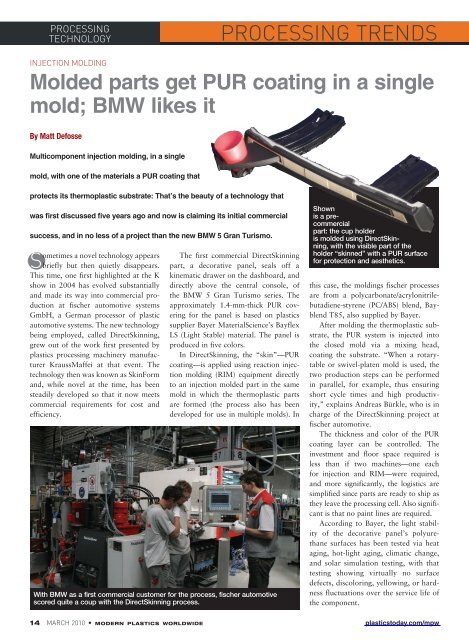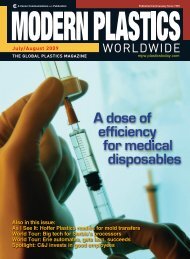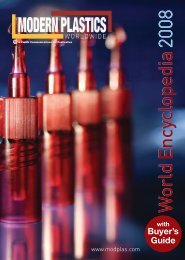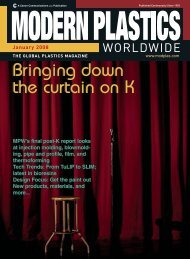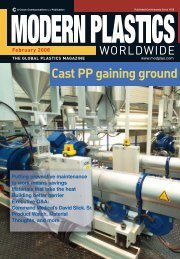Modern Plastics Worldwide - March 2010 - dae uptlax
Modern Plastics Worldwide - March 2010 - dae uptlax
Modern Plastics Worldwide - March 2010 - dae uptlax
Create successful ePaper yourself
Turn your PDF publications into a flip-book with our unique Google optimized e-Paper software.
PROCESSING<br />
TECHNOLOGY<br />
PROCESSING TRENDS<br />
INJECTION MOLDING<br />
Molded parts get PUR coating in a single<br />
mold; BMW likes it<br />
By Matt Defosse<br />
Multicomponent injection molding, in a single<br />
mold, with one of the materials a PUR coating that<br />
protects its thermoplastic substrate: That’s the beauty of a technology that<br />
was fi rst discussed fi ve years ago and now is claiming its initial commercial<br />
success, and in no less of a project than the new BMW 5 Gran Turismo.<br />
Sometimes a novel technology appears<br />
briefly but then quietly disappears.<br />
This time, one first highlighted at the K<br />
show in 2004 has evolved substantially<br />
and made its way into commercial production<br />
at fischer automotive systems<br />
GmbH, a German processor of plastic<br />
automotive systems. The new technology<br />
being employed, called DirectSkinning,<br />
grew out of the work first presented by<br />
plastics processing machinery manufacturer<br />
KraussMaffei at that event. The<br />
technology then was known as SkinForm<br />
and, while novel at the time, has been<br />
steadily developed so that it now meets<br />
commercial requirements for cost and<br />
efficiency.<br />
The first commercial DirectSkinning<br />
part, a decorative panel, seals off a<br />
kinematic drawer on the dashboard, and<br />
directly above the central console, of<br />
the BMW 5 Gran Turismo series. The<br />
approximately 1.4-mm-thick PUR covering<br />
for the panel is based on plastics<br />
supplier Bayer MaterialScience’s Bayflex<br />
LS (Light Stable) material. The panel is<br />
produced in five colors.<br />
In DirectSkinning, the “skin”—PUR<br />
coating—is applied using reaction injection<br />
molding (RIM) equipment directly<br />
to an injection molded part in the same<br />
mold in which the thermoplastic parts<br />
are formed (the process also has been<br />
developed for use in multiple molds). In<br />
With BMW as a first commercial customer for the process, fischer automotive<br />
scored quite a coup with the DirectSkinning process.<br />
Shown<br />
is a precommercial<br />
part: the cup holder<br />
is molded using DirectSkinning,<br />
with the visible part of the<br />
holder “skinned” with a PUR surface<br />
for protection and aesthetics.<br />
this case, the moldings fischer processes<br />
are from a polycarbonate/acrylonitrilebutadiene-styrene<br />
(PC/ABS) blend, Bayblend<br />
T85, also supplied by Bayer.<br />
After molding the thermoplastic substrate,<br />
the PUR system is injected into<br />
the closed mold via a mixing head,<br />
coating the substrate. “When a rotarytable<br />
or swivel-platen mold is used, the<br />
two production steps can be performed<br />
in parallel, for example, thus ensuring<br />
short cycle times and high productivity,”<br />
explains Andreas Bürkle, who is in<br />
charge of the DirectSkinning project at<br />
fischer automotive.<br />
The thickness and color of the PUR<br />
coating layer can be controlled. The<br />
investment and floor space required is<br />
less than if two machines—one each<br />
for injection and RIM—were required,<br />
and more significantly, the logistics are<br />
simplified since parts are ready to ship as<br />
they leave the processing cell. Also significant<br />
is that no paint lines are required.<br />
According to Bayer, the light stability<br />
of the decorative panel’s polyurethane<br />
surfaces has been tested via heat<br />
aging, hot-light aging, climatic change,<br />
and solar simulation testing, with that<br />
testing showing virtually no surface<br />
defects, discoloring, yellowing, or hardness<br />
fluctuations over the service life of<br />
the component.<br />
14 MARCH <strong>2010</strong> • MODERN PLASTICS WORLDWIDE plasticstoday.com/mpw


